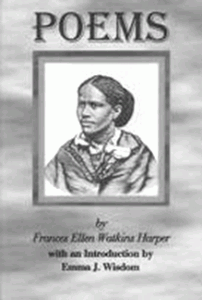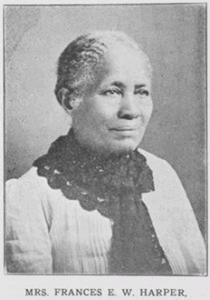The Slave Mother (1854)
Heard you that shriek? It rose
So wildly on the air,
It seemed as if a burden’d heart
Was breaking in despair.
Saw you those hands so sadly clasped–
The bowed and feeble head–
The shuddering of that fragile form–
That look of grief and dread?
Saw you the sad, imploring eye?
Its every glance was pain,
As if a storm of agony
Were sweeping through the brain.
She is a mother pale with fear,
Her boy clings to her side,
And in her kirtle vainly tries
His trembling form to hide.
He is not hers, although she bore
For him a mother’s pains;
He is not hers, although her blood
Is coursing through his veins!
He is not hers, for cruel hands
May rudely tear apart
The only wreath of household love
That binds her breaking heart.
His love has been a joyous light
That o’er her pathway smiled,
A fountain gushing ever new,
Amid life’s desert wild.
His lightest word has been a tone
Of music round her heart,
Their lives a streamlet blent in one–
Oh, Father! must they part?
They tear him from her circling arms,
Her last and fond embrace.
Oh! never more may her sad eyes
Gaze on his mournful face.
No marvel, then, these bitter shrieks
Disturb the listening air:
She is a mother, and her heart
Is breaking in despair.
Bury Me in a Free Land (1858)
By Frances E.W. Harper
Make me a grave where’er you will,
In a lowly plain, or a lofty hill;
Make it among earth’s humblest graves,
But not in a land where men are slaves.
I could not rest if around my grave
I heard the steps of a trembling slave;
His shadow above my silent tomb
Would make it a place of fearful gloom.
I could not rest if I heard the tread
Of a coffle gang to the shambles led,
And the mother’s shriek of wild despair
Rise like a curse on the trembling air.
I could not sleep if I saw the lash
Drinking her blood at each fearful gash,
And I saw her babes torn from her breast,
Like trembling doves from their parent nest.
I’d shudder and start if I heard the bay
Of bloodhounds seizing their human prey,
And I heard the captive plead in vain
As they bound afresh his galling chain.
If I saw young girls from their mother’s arms
Bartered and sold for their youthful charms,
My eye would flash with a mournful flame,
My death-paled cheek grow red with shame.
I would sleep, dear friends, where bloated might
Can rob no man of his dearest right;
My rest shall be calm in any grave
Where none can call his brother a slave.
I ask no monument, proud and high,
To arrest the gaze of the passers-by;
All that my yearning spirit craves,
Is bury me not in a land of slaves.
Learning To Read (1872)
Very soon the Yankee teachers
Came down and set up school;
But, oh! how the Rebs did hate it, –
It was agin’ their rule.
Our masters always tried to hide
Book learning from our eyes;
Knowledge did’nt agree with slavery –
‘Twould make us all too wise.
But some of us would try to steal
A little from the book,
And put the words together,
And learn by hook or crook.
I remember Uncle Caldwell,
Who took pot liquor fat
And greased the pages of his book,
And hid it in his hat.
And had his master ever seen
The leaves upon his head,
He’d have thought them greasy papers,
But nothing to be read.
And there was Mr. Turner’s Ben,
Who heard the children spell,
And picked the words right up by heart,
And learned to read ’em well.
Well, the Northern folks kept sending
The Yankee teachers down;
And they stood right up and helped us,
Though Rebs did sneer and frown.
And I longed to read my Bible,
For precious words it said;
But when I begun to learn it,
Folks just shook their heads,
And said there is no use trying,
Oh! Chloe, you’re too late;
But as I was rising sixty,
I had no time to wait.
So I got a pair of glasses,
And straight to work I went,
And never stopped till I could read
The hymns and Testament.
Then I got a little cabin
A place to call my own –
And I felt as independent
As the queen upon her throne.
Songs for the People (1894)
Let me make the songs for the people,
Songs for the old and young;
Songs to stir like a battle-cry
Wherever they are sung.
Not for the clashing of sabres,
For carnage nor for strife;
But songs to thrill the hearts of men
With more abundant life.
Let me make the songs for the weary,
Amid life’s fever and fret,
Till hearts shall relax their tension,
And careworn brows forget.
Let me sing for little children,
Before their footsteps stray,
Sweet anthems of love and duty,
To float o’er life’s highway.
I would sing for the poor and aged,
When shadows dim their sight;
Of the bright and restful mansions,
Where there shall be no night.
Our world, so worn and weary,
Needs music, pure and strong,
To hush the jangle and discords
Of sorrow, pain, and wrong.
Music to soothe all its sorrow,
Till war and crime shall cease;
And the hearts of men grown tender
Girdle the world with peace.
A Double Standard (1895)
Do you blame me that I loved him?
If when standing all alone
I cried for bread a careless world
Pressed to my lips a stone.
Do you blame me that I loved him,
That my heart beat glad and free,
When he told me in the sweetest tones
He loved but only me?
Can you blame me that I did not see
Beneath his burning kiss
The serpent’s wiles, nor even hear
The deadly adder hiss?
Can you blame me that my heart grew cold
The tempted, tempter turned;
When he was feted and caressed
And I was coldly spurned?
Would you blame him, when you draw from me
Your dainty robes aside,
If he with gilded baits should claim
Your fairest as his bride?
Would you blame the world if it should press
On him a civic crown;
And see me struggling in the depth
Then harshly press me down?
Crime has no sex and yet to-day
I wear the brand of shame;
Whilst he amid the gay and proud
Still bears an honored name.
Can you blame me if I’ve learned to think
Your hate of vice a sham,
When you so coldly crushed me down
And then excused the man?
Would you blame me if to-morrow
The coroner should say,
A wretched girl, outcast, forlorn,
Has thrown her life away?
Yes, blame me for my downward course,
But oh! remember well,
Within your homes you press the hand
That led me down to hell.
I’m glad God’s ways are not our ways
He does not see as man;
Within His love I know there’s room
For those whom others ban.
I think before His great white throne,
His throne of spotless light,
That whited sepulchres shall wear
The hue of endless night.
That I who fell, and he who sinned,
Shall reap as we have sown;
That each the burden of his loss
Must bear and bear alone.
No golden weights can turn the scale
Of justice in His sight;
And what is wrong in woman’s life
In man’s cannot be right.



Frances Harper’s poetry is truly inspirational. Her work is powerful and captivating, exploring themes such as faith, justice, and identity with a unique voice. Her words are full of emotion and bring to life a wide range of topics, allowing readers to explore and reflect on the many facets of our shared human experience. Her work is a reminder of the power of words to move and inspire us.
This blog is an amazing source of information and I’m so glad I found it!
This blog is an invaluable resource for anyone looking to stay informed and educated on the topic.
It’s clear that you have a deep knowledge and understanding of the subject matter.
Thank you for sharing your knowledge and expertise generously.